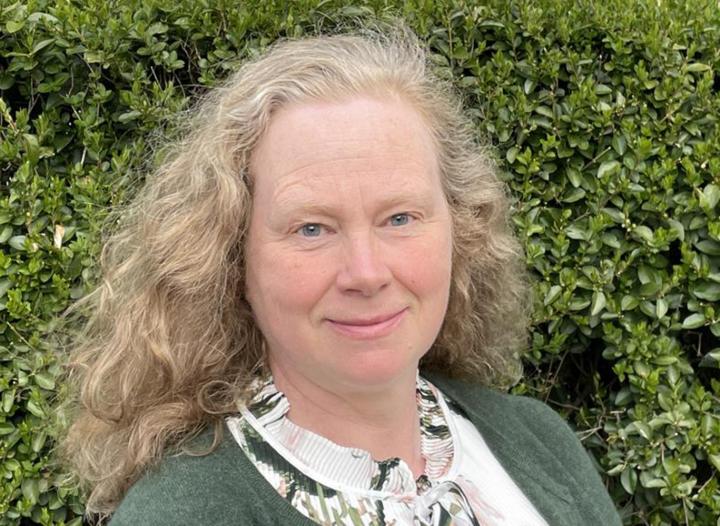The neurobiologist Catherina Becker strengthens CRTD as new research group leader

Credit: privat
Regeneration of the central nervous system, including the brain and spinal cord, has been the central focus of Prof. Becker’s career. Already as a young doctoral student she was fascinated by the ability of fish, frogs, and salamanders to repair their central nervous systems and recover lost function – an extraordinary ability that humans do not possess. Lately, she has dedicated her efforts to uncover the mechanisms behind the successful spinal cord regeneration in zebrafish. Her research aligns perfectly with the goals of the Center for Regenerative Therapies Dresden (CRTD) at TU Dresden, where international scientists focus on discovering fundamental principles of cell and tissue regeneration using a variety of model organisms, organs, and disease systems.
“CRTD is a world-leading institute in regeneration research, and therefore offers a highly attractive research environment,” says Prof. Catherina Becker. “I’m very happy to join CRTD and the TU Dresden with the support of the Humboldt-Professorship. I’m especially looking forward to be part of the vibrant Dresden Johannstadt campus, which offers outstanding opportunities for research collaborations with its neighboring institutes.”
Prof. Becker is a pioneer of spinal cord regeneration research in zebrafish. Over the years her team was able to make several key discoveries. They characterized the neurons in the zebrafish brain that connect to the motor neurons in the spinal cord and showed which of these connections regrow after injury. They identified genes essential for regeneration of nerve extensions that connect nerve cells and transmit electric signals. They have also discovered that the zebrafish spinal cord contains stem cells that replace damaged neurons after the injury. Most recently, the Becker group has shown that the immune system plays an active role in spinal cord repair.
“It is a great success for the TU Dresden to welcome another Humboldt Professor,” says Prof. Ursula Staudinger, rector of the TU Dresden. “This is also a great success of the Center for Regenerative Therapies Dresden. Prof. Catherina Becker is already the second Humboldtian at the CRTD, after Prof. Michael Sieweke who joined the institute in 2018. This emphasizes the excellence status of the CRTD and its world-class regeneration research.”
“As a pioneer of the spinal cord regeneration research in zebrafish Prof. Becker is a true asset to our institute and to the TU Dresden. The CRTD and our research community will gain a lot from her expertise,” emphasizes Prof. Federico Calegari, director of the CRTD. “We are also proud to host both of the TU Dresden Humboldt Professors in our institute.”
About Prof. Catherina Becker
Catherina Becker received her PhD from the University of Bremen, where she studied development and regeneration of the optic system of frogs and salamanders with Prof. Gerhard Roth. As a postdoctoral researcher at the Swiss Federal Institute of Technology (ETH) in Zurich, she worked in the group of Prof. Melitta Schachner. Her research focused on the role of cell adhesion molecules in the central nervous system and was funded by an EMBO long-term fellowship. In her second postdoctoral position she worked on the regeneration of the optic projection in zebrafish with Prof. Ron Meyer at the University of California at Irvine, USA. In 1998, she joined the Center for Molecular Neurobiology (ZMNH) in Hamburg to work on the spinal cord regeneration in zebrafish. In 2005 she joined the University of Edinburgh in Scotland as a Senior Lecturer. She was promoted to professor in 2013 and has most recently been the Deputy Director of the Centre for Discovery Brain Sciences.
In 2014, Catherina Becker was elected as a Fellow of the Royal Society of Biology. In 2016, she received the Suffrage Science Award from the MRC London Institute of Medical Sciences as well as the Eurolife Distinguished Lecturer Medal.
Prof. Becker is moving to Dresden together with her husband and collaborator Dr Thomas Becker. The couple has two children.
###
The Alexander von Humboldt Professorship
The Alexander von Humboldt Professorship is the most prestigious German scientific prize. It has been awarded by the Alexander von Humboldt Foundation since 2008. The Humboldt Professorship aims to attract world-class scientists from abroad to Germany. The awardees receive five million EUR over the period of five years to support their research. The program is funded by the Federal Ministry of Education and Research (BMBF).
About the Center for Regenerative Therapies Dresden (CRTD)
The Center for Regenerative Therapies Dresden (CRTD) of TU Dresden is academic home for scientists from more than 30 nations. Their mission is to discover the principles of cell and tissue regeneration and leveraging this for recognition, treatment and reversal of diseases. The CRTD links the bench to the clinic, scientists to clinicians to pool expertise in stem cells, developmental biology, gene-editing and regeneration towards innovative therapies for neurodegenerative diseases such as Alzheimer’s and Parkinson’s disease, hematological diseases such as leukemia, metabolic diseases such as diabetes, retina and bone diseases.
Since 2016 the CRTD is part of the central scientific unit “Center for Molecular and Cellular Bioengineering” (CMCB) of the TU Dresden and plays a central role within the research priority area Health Sciences, Biomedicine, and Bioengineering of the TU Dresden.
Web: http://www.
Web: http://www.
Media Contact
Dr. Magdalena Gonciarz
[email protected]




